What Should Bariatric Patients Do if They’re Always Hungry After Working Out?

It can sometimes feel like a chore. As a bariatric patient, not only do you have to limit your diet and the calories you consume, but you must also go and work out. Sometimes, especially when motivation is waning, keeping this kind of schedule can be challenging, to say the least; even more challenging, however, is getting to the gym and doing your workout, yet feeling hungry afterward. Before we get into how to manage this, you need to know that this is normal. When our bodies work hard, we crave what we need to recover: restorative nutrition. However, uncontrolled eating after a workout needs to be limited. Let’s talk about how to do it.
Why Beer May Be the Worst Drink After Bariatric Surgery
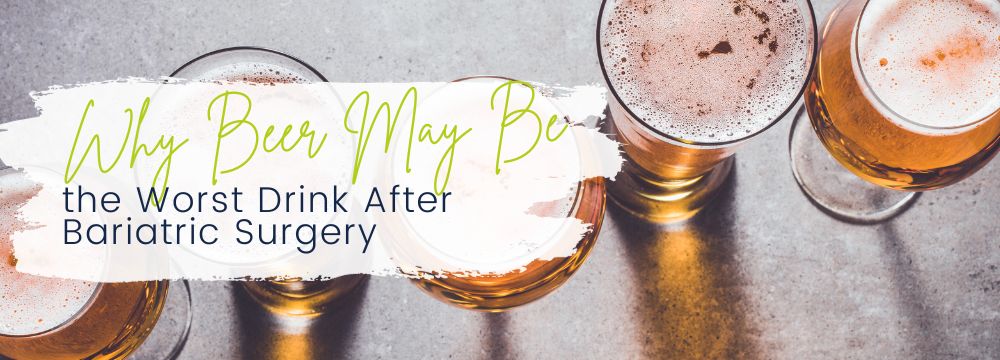
What you drink after your surgical procedure makes a big difference in your eventual results and how you feel. Of course, we advocate for all patients to drink plenty of water and indulge occasionally in drinks that are low in calories and sugar (and complement the post-op diet nicely). However, the question of beer does sometimes pop up, mainly because many patients will have been used to enjoying a beer during a football game or at dinner, and it may be their preferred alcoholic beverage. With that said, while moderation is key, and most bariatric programs don’t want to limit their patients’ enjoyment too much, the simple fact is that beer is one of the more problematic beverages after surgery. Let’s dive into why:
How an AHA Statement on Diets Affects Bariatric Patients

Though it’s a different specialty, bariatric surgeons always take note of guidance from the American Heart Association or AHA. We do so because many metabolic disorders we treat are reflected in longer-term heart disease. When patients experience significant excess weight issues, especially obesity, the heart takes the brunt of the problem. For example, patients who are obese tend to have accelerated atherosclerosis or narrowing of the arteries due to plaque buildup along their walls. Type two diabetes is also a widespread consequence that can constrict arteries and cause cardiovascular issues and problems with virtually every organ in the body.
So, we listen when the AHA provides guidance on the diets they think are best for heart health. This is precisely what was published in Circulation recently. After reviewing comprehensive studies on diets, the AHA released its list of best diets, giving each a percentage score and grouping them into three distinct tiers.
Three Tricks to Reducing Negative Self-Talk After Bariatric Surgery

Years, or even decades of excess weight, have likely made you question yourself, beat yourself up, and create a mental environment of negative self-worth. It sounds extreme when you read it on paper, but everyone does it to some degree or other, no matter how fit, intelligent, or beautiful they may be.
These years of beating yourself up and putting yourself down don’t just go away when you lose weight, even if your negative self-talk was very much weight related. Our minds are very flexible, and adaptability allows for significant changes that are needed to reverse some of these thoughts and actions. For example, think of a habit. Getting into a routine is often straightforward but surprisingly difficult to remove yourself from. As such, anyone who tells you that positive self-talk is all you need to get back on track doesn’t understand how the brain is wired for the challenges one faces after bariatric surgery.
Rethinking How You Consume Your Daily Water

You might wonder why every clinician you meet emphasizes drinking enough fluid after your bariatric procedure, and ultimately it comes down to one fundamental reason. Dehydration is a leading cause of hospital readmission after bariatric surgery. Drinking water after weight loss surgery may seem relatively straightforward. It can be difficult, even for a patient with an average size stomach, let alone someone whose stomach has been surgically reduced to just a few ounces.
Along with getting enough water, we must take physical and psychological cues from our bodies to know if we are drinking at the right time. While you may read the guidance of drinking 64 ounces or 8 cups daily, the amount you need will vary dramatically, depending on your exercise patterns, the temperature outside, and more. For most active post-bariatric patients, it may be closer to 80 ounces per day. Let’s delve deeper into what you should consider when determining how much water you need:
Understanding GERD Treatment Options: LINX, Fundoplication, and Gastric Bypass

Obesity is linked to an increased prevalence of gastroesophageal reflux disease (GERD) – a chronic and persistent form of acid reflux. GERD can lead to severe complications, such as Barrett’s Esophagus, which increases the risk of esophageal cancer. In this article, we will compare LINX, fundoplication, and gastric bypass as treatment options for GERD.
Traditional Treatments for GERD
Lifestyle interventions such as improved diet and exercise are the most effective ways to address GERD. However, many patients rely on proton pump inhibitors (PPIs) to reduce stomach acid production. While PPIs can alleviate GERD symptoms, they may also have long-term side effects, such as bacterial dysregulation and alkaline burns to the esophagus.
Gastric Band Failure. Will It Happen, and What to Do?

The gastric band (Lap-Band & Realize Band (no longer on the market)) was a revolutionary device introduced over a decade ago as the first bariatric surgery that was adjustable and fully reversible in cases of need. Unlike stapled procedures, which are a one-and-done solution, your bariatric surgeon could implant the band and adjust it quickly and easily by increasing or decreasing the volume of saline in the small pillows that make up the inner part of the band. By adding saline, the band could be tightened, and patients would, theoretically, eat less; removing liquid loosened it, allowing the patient to eat more and relieve issues associated with overtightening.
Embarking On Your Fitness Journey After Weight Loss Surgery
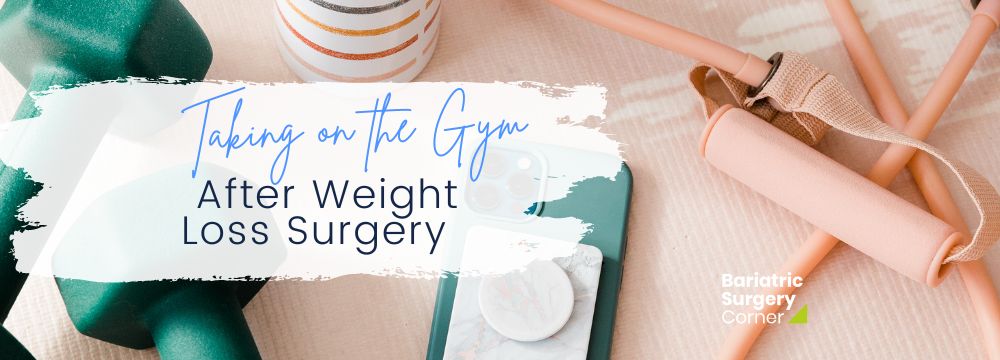
Recovering from weight loss surgery and beginning your new gym life can be daunting. Whether it’s your first time at a gym or you’re returning to a previous workout routine, it’s crucial to make the right decisions for your body as it adapts to new and old exercises. In this guide, we’ll explore how to ease back into a healthy lifestyle without pushing your limits.
Maintaining and Building Muscle After Bariatric Surgery

As a postoperative bariatric patient, you will experience plenty of physical and emotional changes. One such change is musculature. Well-developed muscle offers several benefits. It helps maintain joints, bone, tendon, and nerve structure, and it also helps burn more calories at rest, which aids in weight loss. However, the restrictive nature of the post-bariatric surgery diet can make it difficult for patients to maintain that muscle mass, let alone build more.
The Four Things Anyone Considering Bariatric Surgery Should Know
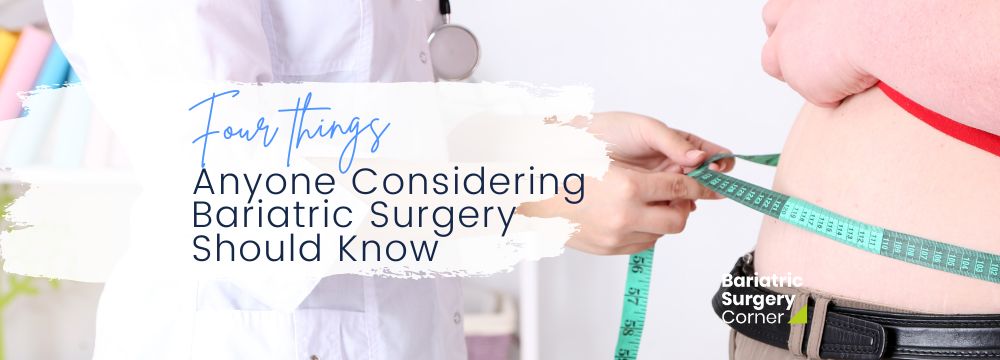
Prepare Yourself for CHANGE in Every Aspect of Your Life.
This one word – change. At first, when you hear it in the context of bariatric surgery, you are just so focused on getting thinner and healthier that you’re simply thinking of the physical. However, this choice and the change it ushers in will also affect every part of your life/work balance, relationships, mental health, family relations, and friendships. Social dynamics change a lot as you see life through a different lens. Dealing with that feeling can be emotional. Thoughts will go through your head like:
This never happened to me before; more smiles, more friendly people, more willing to help. Why?
The Effects of Abdominal (Visceral) Fat
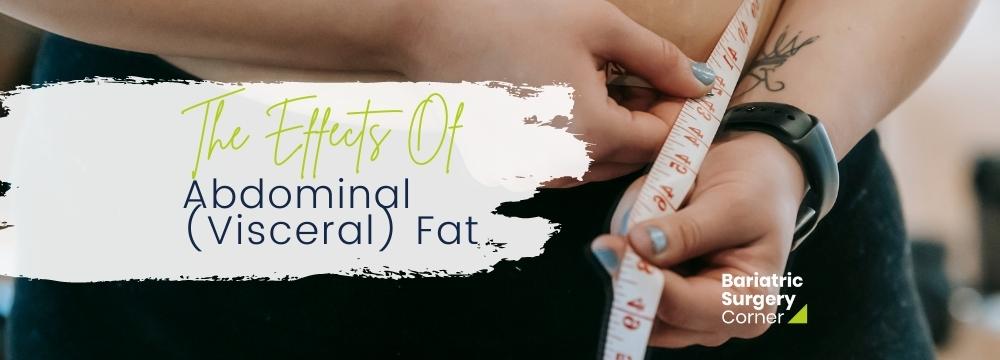
When we weigh ourselves or look in the mirror, we don’t dig much deeper than the number on the scale or the image staring back at us. This is human nature, and we all do it. Similarly, when we visit our primary care physician for a yearly physical, we might learn more about the effects of our excess weight on various metabolic markers, like cholesterol, blood pressure, and diabetes. But by worrying about numbers alone, we often ignore the less obvious issues, like where the fat has accumulated. Visceral fat, the bad fat that accumulates around the abdomen is a serious concern and one that has not yet been given the importance it deserves.
A fascinating fact about abdominal fat and waist size is that the latter can predict heart disease more accurately than the ubiquitous body mass index or BMI. Female patients with a waist size over 35 inches and males with a greater than 40-inch waist ratchet up to a significantly higher risk of heart disease and other obesity-related conditions. One of the reasons for this is the pro-inflammatory effect visceral fat has throughout the body.
How Do I Tell My Spouse to Have Bariatric Surgery?

One of the most upsetting things to see in a relationship is your partner struggling with their weight and continually yo-yo-ing up and down. Getting excited at the achievements but then falling into deep frustration and maybe even depression at every failure. While it can be difficult and frustrating to watch, it is something that most partners of those suffering from obesity must live with as they try to lose weight. Ultimately, the hormonal and metabolic barriers to losing a significant amount of weight are such that 90 to 95% of obese patients trying to lose weight with diet and exercise alone simply can’t do so.
Much like other chronic diseases, obesity does not just affect the person. The entire family often suffers, even if they are not obese. A spouse may not be able to have the emotional and physical relationship with their partner that they once had or hoped to have. Kids often lose out on their parent’s attention and physical presence because of their inability to perform certain activities due to weight or navigating the parent’s preoccupation with body image and the emotional roller coaster that comes with struggling with weight.
A Weight Loss Journey Requires Vulnerability

When we’re younger, we’re fearless. We don’t mind climbing trees, making friends with strangers, or telling our secrets to people we’ve just met. We open our eyes and hearts to new experiences and people and trust that everything will be okay. But, somewhere along the way, we learn that vulnerability can hurt and be uncomfortable.
Brené Brown, a renowned professor, lecturer, author, and podcast host – best known for some popular TED Talks, has focused her research on shame, vulnerability, and leadership. Ironically, all 3 of those things can relate to a person on a weight loss journey and the journey itself.
So How Much Weight Should You Be Losing?
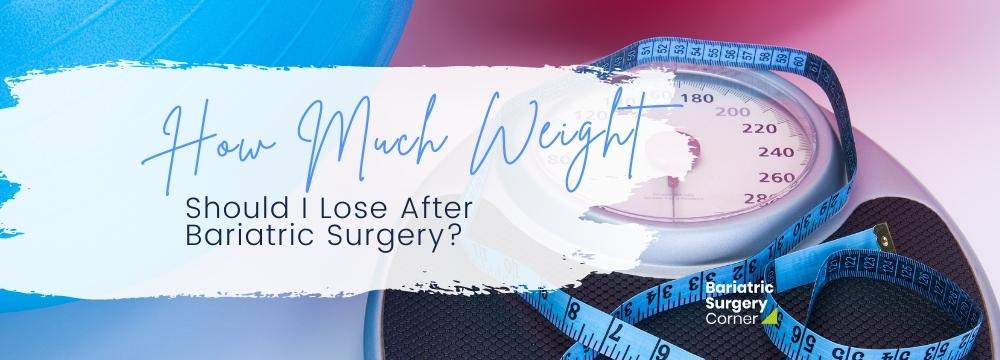
The weight loss process after bariatric surgery is different for each of us. So too, will be the journey and challenges toward our goal weight. That said, there are benchmarks that we should use to understand if we are losing enough or if we’re losing too much. However, before we get into the details of how much weight you should lose each week or each month, it’s essential to understand that weight is not the only or even best marker of success. There are many other determinants of success after bariatric surgery, including waist size, body shape, cholesterol levels, blood pressure, blood sugar, physical improvements, psychological well-being, and more.
Of course, it would be unreasonable for us to expect those who have had bariatric surgery to ignore or somehow minimize their weight loss progress. After all, measuring your weight is the most accessible (and frankly, exciting) marker – you just need a scale.
A Common Myth. You Will Have Dental Issues After Bariatric Surgery

Bariatric surgeons have heard it all, and many patients are concerned about dental issues after their bariatric procedure. You may see reports on the Internet about teeth falling out and other wild stories on the dental consequences of surgery. But do they hold any water? The answer is a resounding no. However, patients must understand that their habits before and after bariatric surgery can make a big difference in the health of their teeth and mouth.
